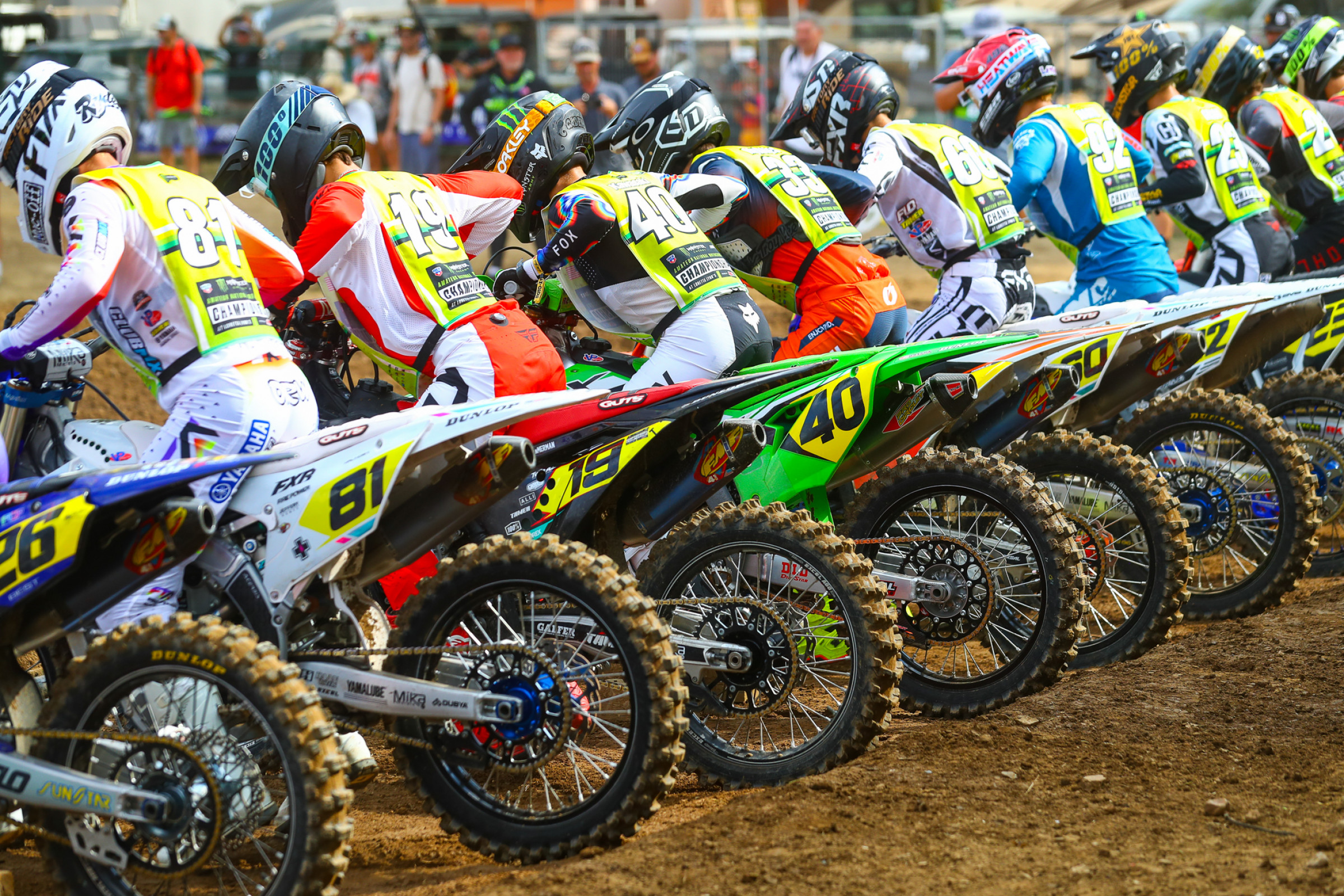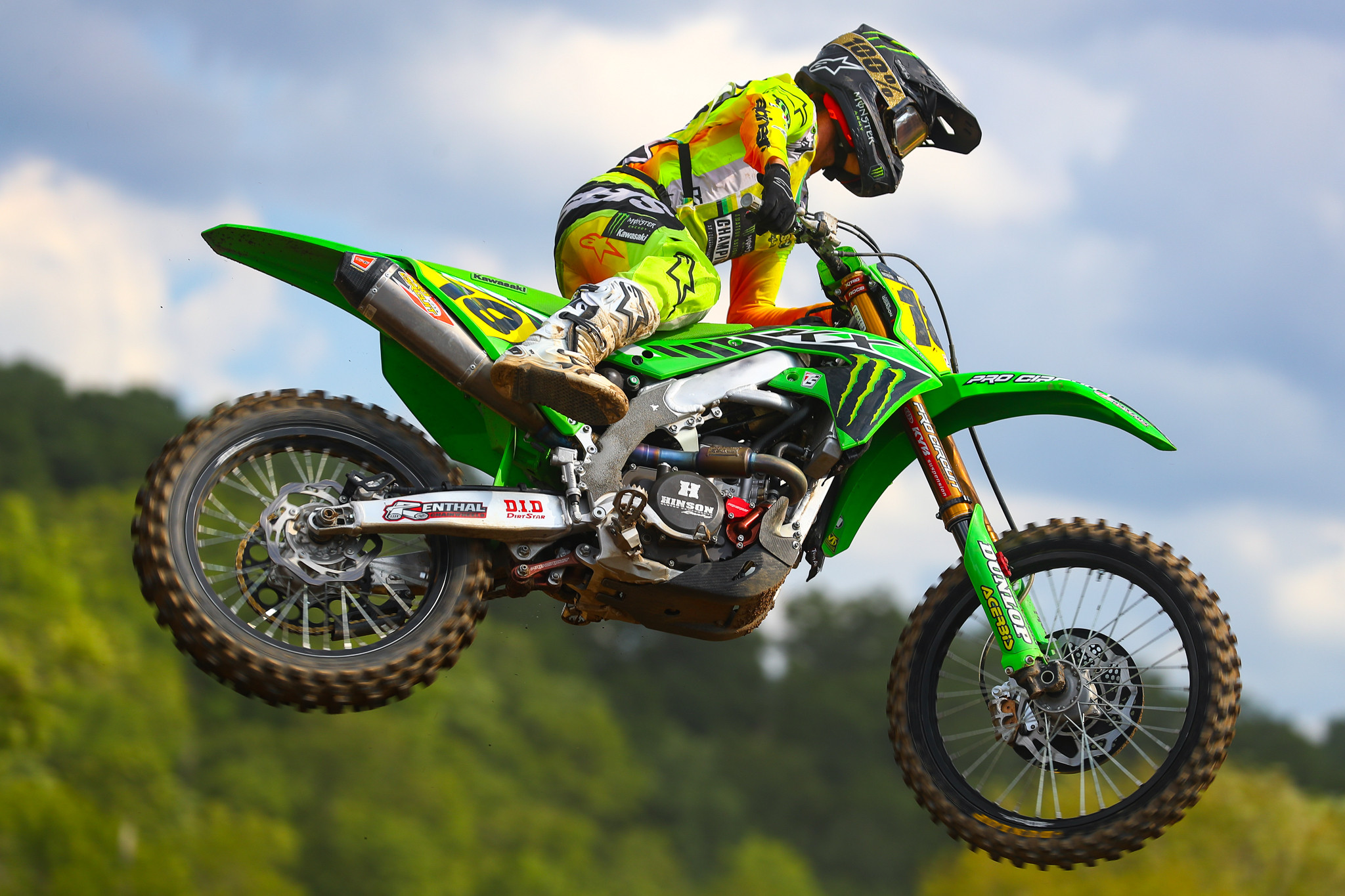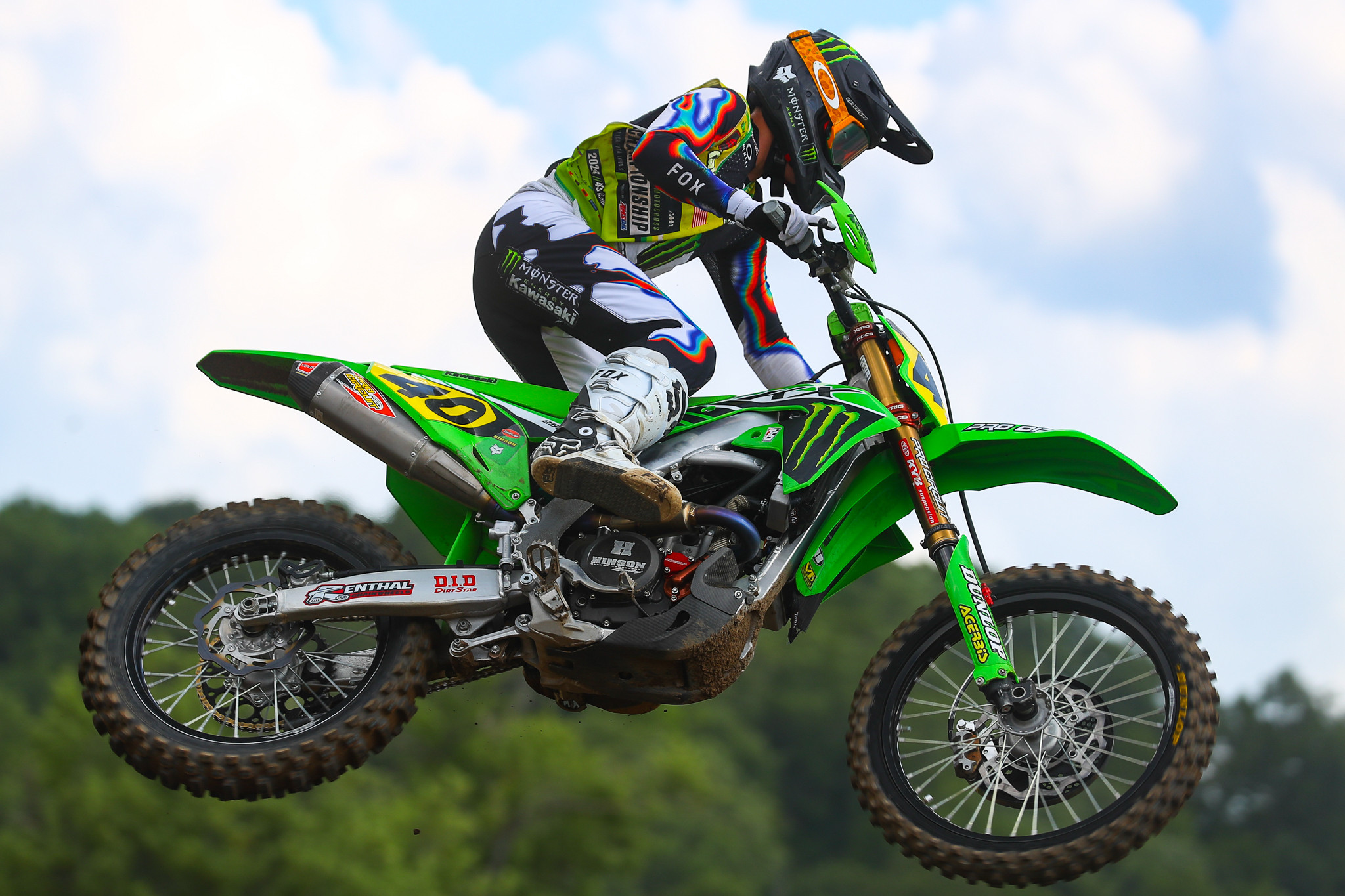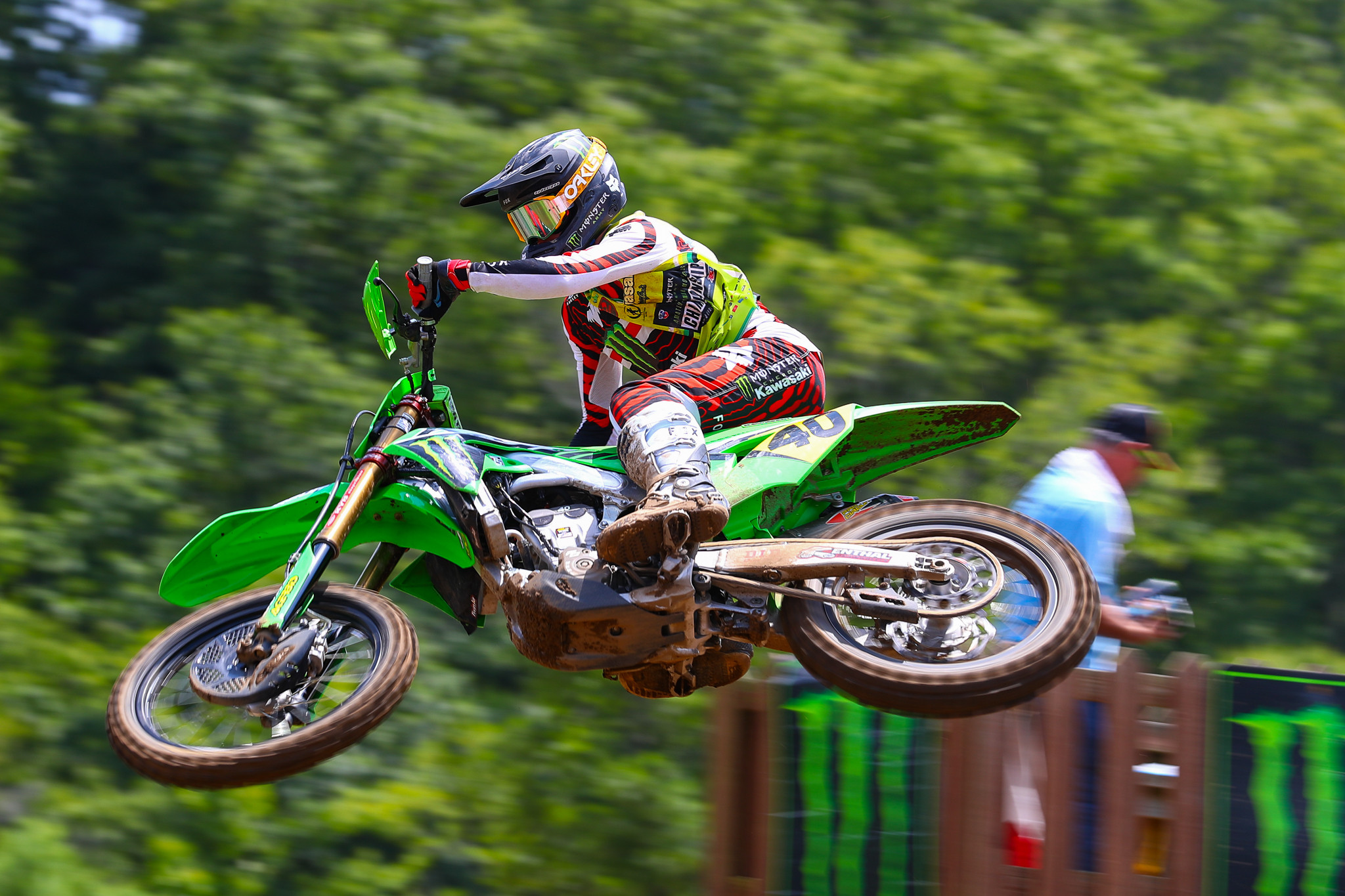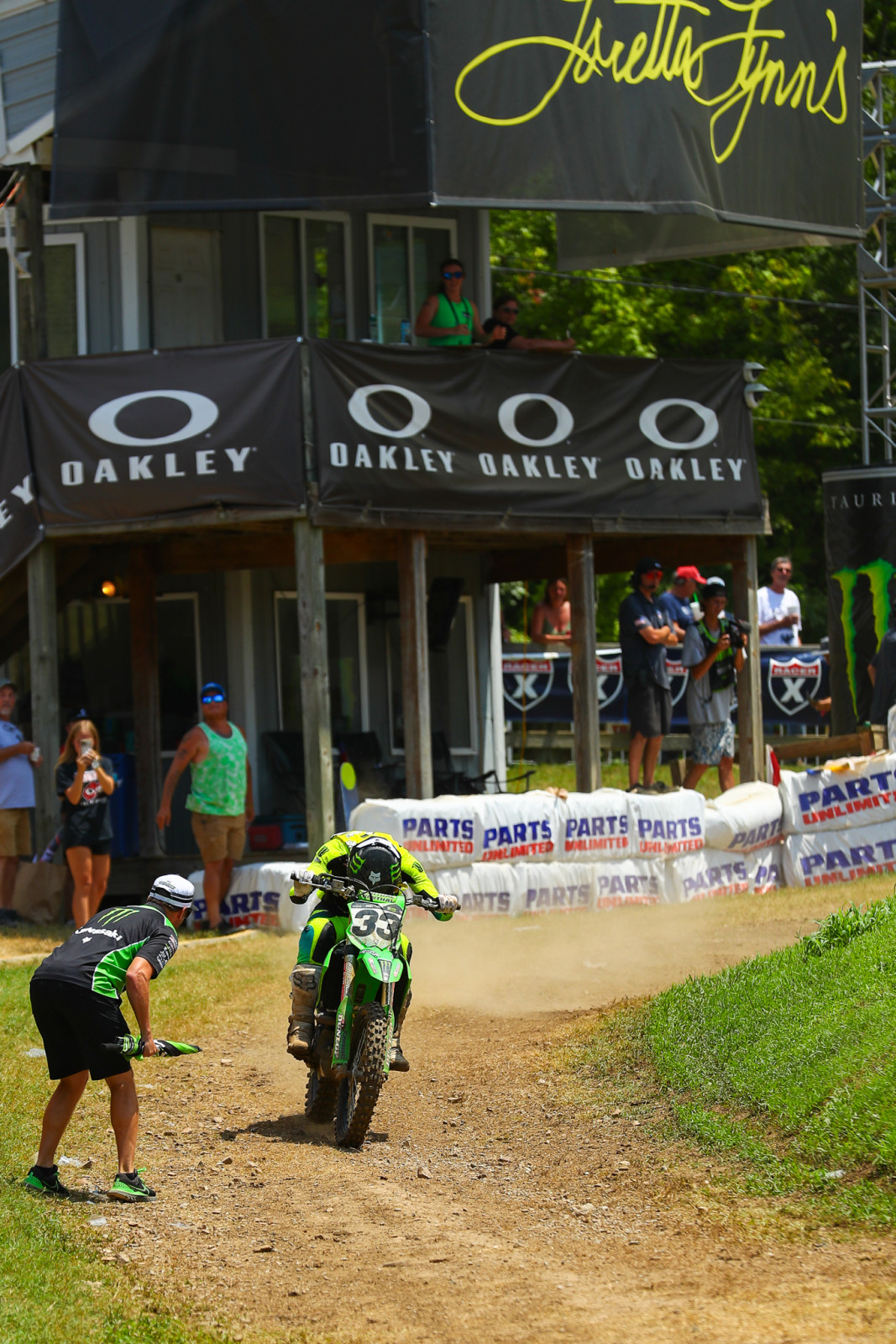Jason Weigandt called up Team Green Kawasaki team manager Ryan Holliday earlier this week for an update following the Monster Energy AMA Amateur National Motocross Championship at Loretta Lynn’s Ranch. Team Green had a strong year, with big wins from Drew Adams (250 and Open Pro Sport, plus the Nicky Hayden AMA Horizon Award) and Caden Dudney (250B and Schoolboy 2) in two of the top classes. As Holliday pointed out, it had been almost ten years (!) since Kawasaki won their last A class titles at Loretta’s. Like many in the industry, Holliday has worn many hats—from a journalist and photographer for us here at Racer X to working for the American Motorcyclist Association (AMA) and more up to his current role—so he has seen the sport from several different aspects. In the podcast, Weigandt and Holliday discuss the Team Green Kawasaki program and how the amateur game is changing. Holliday said there is a push—both on his end and in general—for amateurs to race more often throughout the year. Check out a snippet from this Holliday interview and listen to the full podcast if you missed it.
Racer X: Now, I'm gonna start at the very top this weekend. You have Drew Adams making a debut. So, the transition from Team Green to Pro Circuit. But what I want to ask you about is, I think on the outside it doesn't look like there's a transition. Like I know, for example, he didn't race Budds Creek because he's got to get used to a totally different bike. So, just explain this process of it looks like he's just going, the graphics are even similar one way to the other. But there's a bigger transition, I think from Team Green to Pro Circuit than people even realize it's not even the same business arrangement deal necessarily, right?
Ryan Holliday: I mean, yes and no, but truthfully the biggest reason why…if it was up to him, he would go race this weekend at Budds Creek 100 percent. That's truthfully what he really pushed for, that's what he wanted to do. But for us, we kind of, we pumped the brakes on that collectively just because he needed a break or we wanted to have him give him a break because realistically he had been racing every weekend since his regional qualifier, which was Memorial Day weekend. So, for a 16-year-old who hadn't really gone through the motions like that yet, you know, he was nine, ten weeks straight getting on airplanes and going racing every weekend. You know, like a real professional does and realistically didn't have the breaks. Like, you know, outdoors took a break, a two-week break or they had a break. Uh, what is it in between Colorado.
Yeah, four in a row is like the max that they actually do.
Yeah, exactly. You know, outside of supercross, when you're in the 450 class you're going 12, 13 weekends in a row. So, he had to take on a really heavy load. He did a Kawi photo shoot for us in between there. Obviously, the whole week at Loretta's from there back to Canada and then went from Canada straight to California on Monday and then got on the Pro Circuit bike on Tuesday, rode Tuesday. He did Tuesday, Thursday last week. So that would have put him into the weekend and we're like, “We know you're gonna wanna go race. We know you're gonna love the bike. Let's take a weekend off and come into Ironman as rested and ready as possible.”
Yeah, that was enough time. The bike is different, but that wasn't an issue. He would have had enough, two days is enough to go racing.
Yeah, I mean, from his point of view, truthfully like, I didn't get to go to the track his first day on it but I sent him a text that night. I'm like, how, how's your new bike? And you know, he was over the moon about it with some, some, uh, excited language in there. [Laughs] So I knew I knew he would be ready to go. But like I said, we were sticking to the plan to, to get him some rest and then, you know, try to come into Ironman as fresh as possible and almost build that excitement a little bit more for him too.
A couple things on this topic. Just explain it is a different bike. What they race as amateurs for Team Green and then what Levi Kitchen is on.
Yeah. I mean, obviously as, you know, it's a KX250 at the end of the day. What we put together as a Team Green package, we do develop with Pro Circuit, of course. But, you know, he's using production suspension on his Team Green bike. So, it's the fork and shock that come on it. And you know, we work with Pro Circuit just to develop the setting and spec for him. And then the engine package is, it's the kit that Pro Circuit sells. So, you know, we always love to be able to tell people like, “the Team Green package is a package that's available to anybody out there.” So, it was funny after that first day, one of the things he said to me was, “You've been holding out on me this whole time.” I'm like, “Well, it's not that we're holding out on you, but we want you to have that next step. When you go to the race team, we don't want you to go from the Team Green bike to the Pro Circuit bike and be like, ‘I don't get it, like, what's the big deal? It's like the same thing.’” So, the Team Green bike is great for and it's competitive for the racing at that level. And then obviously when you get to Pro Circuit and get on their bike, that's what's necessary for that level of racing.
So, it's the difference of a customer could call Pro Circuit and basically get the bike that you race a pro circuit bike, but it's a customer package. And then what Mitch is racing on Saturday with kitchen or whatnot. That is the stuff that's race team proprietary.
Exactly. Obviously, you know, you're talking about a factory motorcycle at that point. But even the suspension, you know, you can go get that Showa A-Kit suspension that the Pro Circuit team uses. For us on the Team Green side right now, we're using the production based stuff to keep it a little bit more simple. So even that's a bit of a transition, but, you know, ultimately, we expect them to get on that bike and, you know, it is better, we know it's better. So, it's just getting comfortable with that, but realistically it doesn't take too long because again, they're running works tires and, you know, higher end suspension components, the motors got higher end parts in it. So naturally it's just a better motorcycle all around.
Now, let's talk about the Canada thing. I know you were also a proponent of the Scouting Combines, [Supercross] Futures, all these things, essentially trying to get these amateurs to start racing more again, like they used to when, when you were an amateur. So, is the Canada thing part of that? Like we want him to get gate drops or is that just a Drew Adams and his camp decision?
I would say it was definitely a collective thing early on in the year. Long-time friend of mine, Dan Truman that works down there with the Lawrences at the compound where Drew rides at. We were talking about ideas to go race and initially we were talking about EMX and going to Europe, but just looking at the calendar and the logistics and everything of it, there was kind of a window that we maybe could get it done. But, you know, obviously he was doing Supercross Futures, and we were definitely focused on doing that and trying to do well there, which he was. So, it's such a massive commitment to go over there. It's a whole another level of the logistics of it and timing and even to go do, let's say two races, you almost have to commit a month traveling over there, finding a place to live, practice bikes, people to look after everything. It's a lot. So, between the logistics of the timing, that wasn't really the best thing and then we talked about Canada. So, we started reaching out and, and contacting people there to see, see what would work and what made the most sense and calendar wise, the first three races, fit all he had to do, the only really thing he had to give up was adjust where he qualified for Loretta's. So he had to travel up north to High Point, which was a ways from him in Florida, do his regional qualifier. And then assuming everything went well there, then the next weekend is when he went to the first round in Canada. Otherwise, if something happened at High Point to where he needed his backup, you know, those first three races weren't gonna work because we needed him to go do his Loretta qualifier. He did those first three and Drew came to me and said, “I want to keep racing. Like I'm, I'm really benefiting from this. I'm learning so much. I feel like I'm improving. I want to keep going.” And this is after he had already won a moto at the first round. He went 1-DNF at round two and then had a pretty dominant 1-1 at the third round. So it, I think it would have been easy for him to say, “I came up here I won. I'm good. I don't wanna do it.” But it, it was him that really pushed to keep going for the rest of the year and do the remaining rounds. So, I thought that was really commendable on his part to wanna commit to doing it, knowing what came with it, with the travel and the schedule. And, you know, we went from RedBud to go for Dunes in a day, driving over to Canada flying in from, uh, Canada straight to Loretta's on practice day. You know, it was a big toll on him.
Yeah, because I think it would be easy to be like, “You're 16,17, 18 years old, you don't get tired.” But no, it does add up.
Yeah, absolutely. The one weekend he had an off weekend, I can't remember specifically which round it was there. But he struggled, he crashed on the first lap or first turn and it was in the back both motos and had to come from behind him and he went 6-4,6-3, something like that. Just not a great day after he had been winning in pretty convincing fashion. And, you know, he was just like, “I didn't have it this weekend. I was just worn out.” So, you see that in Pro Motocross, you see that in supercross. So, it's something he got to experience very early on. And one of the things that he talked about in wanting to continue racing after those first three was understanding what it takes to manage a championship. And, you know, he looks back on it now and he sees where he lost it. You know, it was the race that he crashed, and he pulled off. If he would have continued and got 15th, he would have got points. That bad weekend where he goes 7-4, 6-4, whatever it was, you know, that needed to be a 4-4 day or a 3-3 day and those at the end of it… look, he lost by two points. So, take one of those motos and give him two more points and he gets it.
Is this an overall though thing you're thinking this was specific to him somewhat but developing riders by getting them to race more. I mean, racing in Canada is about as close as you're gonna get: these are real tracks, real pros long motos, all the travel. But is that a general plan? Not just Canada but try to get the guys to race more.
Yeah, absolutely. And that's something I know myself has been pushing for a lot of years now is to try to create more opportunities for better racing here in the States. And that's something where the combines were born out of and obviously Supercross Futures now has come along and we're pushing to have more of each of those and make some changes behind the scenes in the class structure with amateur motocross to try to create more opportunities with better competition and better racing because ultimately, it's gonna help all of these kids be more prepared and have a better understanding of what comes next.
Yeah. And honestly, it's funny that it has the word scouting right in Scouting Moto Combine. And I know when we go there, most of the riders are already on teams per se. But isn't it easier for you and anyone that's doing your type of job at another brand, you're trying to make your best educated guess on who to put money on for the future. This just gives you a better, like playing field to figure out what you're working with, right?
Well, absolutely. And, and one of the things, it's funny you talk about with the amateur motocross events or the ones that have been the long running events, your Mini O’s, Loretta's, Texas, things like that. Drew spoke about it this year, you know, that was his 10th year of going to Loretta's 10 years in a row, which is, I guess your typical lifespan of an amateur kid going there if they're, if they're there from 50 class on up, but they're so… it's on repeat every year. You know, they go to Mini O’s and, and they've all been there for 10 years in a row. They go to a place like Freestone, and they've been there 10 years in a row. It’s automatic to them. They, they go out on those tracks in the first lap, they just know everything and they're up to speed and there's no, almost no learning involved because in those tracks have been relatively unchanged over the years. So, it's just automatic to them. Whereas they go to a place like Ironman or RedBud that they've never been before. Some of them and it's all new. And I, I remember, uh, one of our kids ends a Timmerman, uh, maybe two years ago, had gone to the Ironman combine and it was his first time there. And he was like, this is the biggest track I've ever ridden. Like, the straightaways are so long and I'm like, he's like, I'm on the gas and I let off and I still have 100 yards to go and I have to get back on the gas again. Like, so it was this adjustment for them to, to, you know, learn a totally new track and a different style of track than, than maybe what he's accustomed to on the west coast. So, all of those things are really valuable.
Make sure to listen to the full interview on the Racer X Podcast Network.

